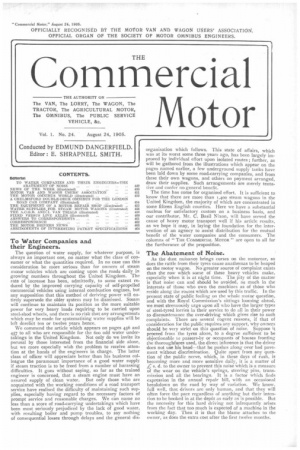To Water Companies and their Engineers.
Page 1

If you've noticed an error in this article please click here to report it so we can fix it.
The question of water supply, for whatever purpose, is always an important one, no matter what the class of consumer or what the quantities required. In no case can this consideration be more serious than for owners of steam motor vehicles which are coming upon the roads daily in growing numbers throughout the United Kingdom. The rate of increase has been, admittedly, to some extent reduced by the improved carrying capacity of self-propelled commercial vehicles using internal combustion engines, but any supposition that this method of deriving power will entirely supersede the older system may be dismissed. Steam will continue to maintain its position as the more suitable power for very heavy loads requiring to be carried upon steel-shod wheels, and there is no risk that any arrangements which may be made for systematising water supplies will be left derelict ten or twelve years hence.
We commend the article which appears on pages 456 and 457 to all who are responsible for the 600 odd water undertakings in the United Kingdom. Not only do we invite its perusal by those interested from the financial side alone, but we more especially wish the problem to receive attention at the hands of the engineers in charge. The latter class of officer will appreciate better than his business colleague the paramount importance of a good water supply if steam traction is to be freed from a number of harassing difficulties. It goes without saying, so far as the trained engineer is concerned, that a steam engine must have an assured supply of clean water. But only those who are acquainted with the working conditions of a road transport service have realised the difficulty of maintaining such supplies, especially having regard to the necessary factors of prompt service and reasonable charges. We can name no less than a score of road-carrying undertakings which have been most seriously prejudiced by the lack of good water, with resulting boiler and pump troubles, to say nothing of consequential losses through delays and the general dis organisation which follows. This state of affairs, which was at its worst some three years ago, has been largely improved by individual effort upon isolated routes ; further, as will be gathered from the illustrations which appear on the pages named earlier, a few underground supply tanks have been laid down by some road-carrying companies, and from these their own wagons, and others on payment arranged, draw their supplies. Such arrangements are merely tentative and confer no general benefit.
The time has come for organised effort. It is sufficient to know that there are more than 1,400 steam wagons in the United Kingdom, the majority of which are concentrated in some fifteen English counties. Here we have a substantial nucleus for satisfactory custom on a business basis, and our contributor, Mr. C. Basil Nixon, will have served the cause of heavy motor transport well if his article results, as we hope it may, in laying the foundation for the intervention of an agency to assist distribution for the mutual benefit of the water companies and the consumers. The columns of "THE COMMERCIAL MOTOR" are open to all for the furtherance of the proposition.
The Abatement of Noise.
As the dust nuisance brings curses on the motorcar, so does the rattle from their tyres cause anathemas to be heaped on the motor wagon. No greater source of complaint exists than the row which some of these heavy vehicles make, especially when it is at night time. The pity of the matter is that noise can and should be avoided, as much in the interests of those who own the machines as of these who reside along the routes which are used by this traffic. In the present state of public feeling on the whole motor question, and with the Royal Commission's sittings looming ahead, we most strenuously urge upon all who have the larger types of steel-tyred lorries in their service to do all in their power to discountenance the over-driving which gives rise to such complaints. There are several cogent reasons, if that of consideration for the public requires any support, why owners should be very strict on this question of noise. Suppose it proceed from the tyres alone, to a degree sufficient to be objectionable to passers-by or occupants of houses fronting the thoroughfares used, the direct inference is that the driver does not use his head—that he pushes along over bad pavement without discrimination. Quite apart from any question of the public nerve, which, in these days of rush, is becoming more and more sensitive daily, it is a matter of s. d. to the owner to prevent this noise which is a measure of the wear on the vehicle's springs, steering pins, transmission and all the bearings. It is a factor which finds expression in the annual repair bill, with an occasional breakdown on the road by way of variation. We know, full well, that drivers are only human, and that they will often force the pace regardless of anything but their intention to be booked in at the depot as early as is possible. But the necessity for this hard driVing not infrequently arises from the fact that too much is expected of a machine in The working day. Then it is that the blame attaches to the owner, as does the extra cost after the first twelve months.•
















